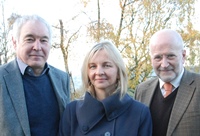£890,000 Big Lottery grant to help older people who experience abuse

Left to Right: Professor Alan Clarke, Sarah Wydall and Professor John Williams
29 January 2015
Alan Clarke, Sarah Wydall and John Williams from the Department of Law and Criminology at Aberystwyth University have been awarded a major research grant of £890,000 from the Big Lottery as part of a £1.3m research project on justice and elder abuse.
The work will be undertaken within the Centre for Ageing, Abuse and Neglect, which is one of the research centres based at the Department of Law and Criminology.
Although the fact that we live longer is welcome, a consequence of an ageing population is that older people may experience abuse at the hands of people they trust. Within the United Kingdom, there has been considerable media coverage of elder abuse in hospitals, care homes and other institutional settings.
However, older people are also abused in their own homes. It may be financial, physical, emotional or sexual. Perpetrators may be family members, people who are supposed to provide care, or so called friends.
The impact of abuse on the older person is often significant leading to social isolation, poor nutrition, fuel poverty and debt. These are in addition to the risk of physical harm because of violence or neglect.
The researchers are concerned that many victims of elder abuse fail to get justice. Prosecutions are rare as are actions under the civil law. Although in some cases prosecution may be the right thing to do, it may also be inappropriate and may worsen the situation for the older person.
The dynamics of elder abuse are complex. An older person who is financially abused by a grandchild, may not want to see them prosecuted – that would impose a strain on the family and could lead to breakdown within the family and the older person being deprived of wider family support.
Professor John Williams, Head of the Department of Law and Criminology at Aberystwyth University said; “Our earlier research shows that victims of elder abuse want two things. First, they want the abuse to end. Second, they want justice. What justice means is often uncertain. It does not necessarily mean criminal proceedings. Other justice options are needed which ensure that the abuse ends and provides the older person with a sense that justice has been done. The project will develop alternative justice options working with older people who are experiencing abuse.”
Stage One of the project involves raising awareness of elder abuse amongst the public and community based services providing support for older people. This stage will be intergenerational with younger people acting as ambassadors. It will also involve supporting practitioners by developing a DVD awareness-raising package on ‘justice options’ and expert advice on referral pathways, types of elder abuse and appropriate responses.
Stage Two of the project Involves using a Justice Advocate to ensure that victims of elder abuse are involved in the decision making process. The Justice Advocate is innovative and will ensure the older person is aware of the range of justice options, and is empowered and enabled to make an informed choice.
Stage Three involves the appointment of an experienced Justice Facilitator to develop hybrid restorative justice/family conferencing intervention models that could provide alternative justice options for the older person. The Justice Facilitator will meet with the older person before this intervention gets under way and do a detailed risk assessment in accordance with national standards. Victim representative groups and other key stakeholders will be involved in the design of the hybrid intervention.
Sarah Wydall, Lecturer in Criminology at Aberystwyth University said; “This project addresses a failure of existing procedures to provide victims of elder abuse with a sense of justice and reassurance that the abuse will not continue. It is highly innovative in its approach, particularly the involvement of victims and the integration of research and practice. Although based in Wales, the findings of the project will have international significance.”
The Project will be of four years duration and has the support of national charities, local authorities and the Older People’s Commissioner for Wales.
